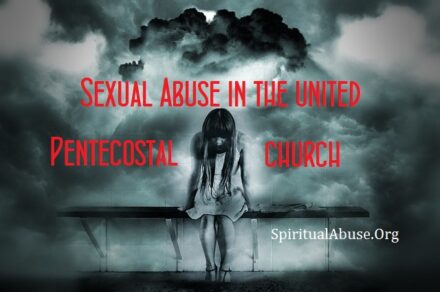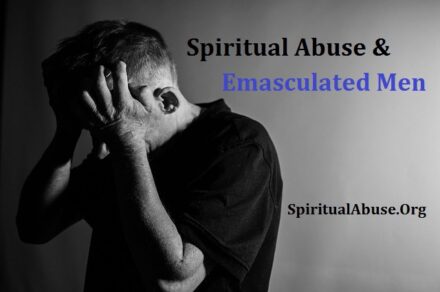Part fourteen of a series of articles.
(Some statements in this article are what have been alleged by one witness, though there are several others which have corroborated events. There have been no convictions as the case mentioned here was not reported to the police and to my knowledge, the alleged perpetrator has not admitted guilt.)
Many now wonder if there has been a habit of covering up and denying child and sexual abuse in evangelical churches in general—if there is something in the evangelical DNA that makes us hesitant to deal with accusations quickly, openly, and truthfully when there is the suspicion of grave sin in our midst. – Mark Galli
In writing this series of articles, besides all the situations I already knew, others have contacted me about additional instances of sexual abuse in the United Pentecostal Church. Since starting this series, I heard about ones coming from a well-known church in Colorado, which started sounding all too similar to what I have heard about Calvary Gospel Church in Wisconsin regarding failure to report. Between the two sets of asterisks below is what a person remembers from one of the alleged instances. In looking into this situation, I conversed with several people, including eyewitnesses to the service described in this report, and based upon their accounts I do not doubt this took place.
Prior to this event, the wife of another youth pastor had allegedly committed adultery with a member of the youth group, though he was of age, possibly in his mid 20s, and it appears to have been consensual. The couple divorced. It has also been alleged that in the 1990s, the pastor found out that the man who was playing the role of Jesus in “The Messiah,” an Easter production, was having an affair. It is claimed that after the discovery the pastor allowed him to continue in the role as it was close to when the play was being presented. These are not the only troubling situations surrounding this church and they don’t all pertain to sexual matters. One individual shared with me that in their opinion they have never seen a more corrupt district than the Colorado District of the United Pentecostal Church.
**************
Growing up, we seemed to have a revolving door when it came to youth pastors. They would come and go frequently, and it was always heartbreaking when you got attached to a new youth pastor only to have them disappear in a year or two.
Then, a young, cool youth pastor was announced. He and his wife were the epitome of good looking, well-bred UPC ministry. His adorable wife was the envy of many young girls for her gorgeous dark hair and fashionable clothes, while the youth pastor himself was what many young girls hoped their husband would look like one day. They toted around a sweet chubby cheeked baby boy that we all fell in love with and begged to babysit. We were smitten.
For almost two years, I thought we had finally hit the jackpot with who I will refer to as Youth Pastor X. Things seemed to be going amazingly well, the youth group was thriving, and we felt loved and cared about by leaders at our church.
Then, one Sunday evening, they weren’t at church, which was really odd, as they had just been at youth service the Friday evening before so they couldn’t have been out of town. At the end of the church service, the pastor of the church stood in the pulpit and said we would be having an all church meeting and he asked our visitors to leave at that time because of the sensitive nature of what he needed to say.
One by one, confused visitors exited the sanctuary with the assistance of church ushers who made sure they had exited the building before the meeting began. Dread sat thick and heavy in my chest. This wasn’t the first time we had a meeting like this. It usually meant that someone was being publicly kicked out of the church.
Slowly, my pastor began explaining that our beloved Youth Pastor X had been asked to resign his position at the church. He did not go into a lot of detail but did say that we were not allowed to have any contact with him or his family and that they were currently packing their moving truck and would be leaving the state immediately.
Questions started swirling in my head…what did they do? Was his wife caught wearing pants? Were they going to movie theaters? This was terrible! And we weren’t even allowed to say goodbye!
As my pastor continued to talk, it was disclosed that misconduct had occurred which left them no choice but to ask Youth Pastor X to leave. No further information was shared, though the pastor did take a few questions that he answered very vaguely.
As the next few days came and went, the truth of the story began to circulate. Youth Pastor X was having a sexual relationship with a 14-year-old girl from the youth group. The strange thing? The fault was entirely pinned on the 14-year-old girl. She was labeled as promiscuous and a bad seed. Everyone knew that she was a bad kid, and this just proved it. She must have come onto Youth Pastor X and he had no power against her. She had a spirit about her and the devil was working in her to ruin Youth Pastor X’s ministry. She was ostracized from the youth group, we all looked at her as though she had ruined his ministry.
No charges were ever filed. Youth Pastor X was allowed to leave the state without a tarnish against him.
**************
At the same time, if the many charges prove to be true to a larger extent than they currently acknowledge, it would be sad and troubling—but not without hope if it leads to truth-telling and repentance. The truth of sin that leads to repentance is one of the most glorious moments in our life in Christ. – Mark Galli
From what former members have shared, in this church it has been the normal procedure to dismiss any visitors in order to address members in regard to problems. The pastors are known for cutting off contact between members and anyone they feel is dangerous to the church.
The identity of the girl was never officially revealed by the pastor but there were people in the church who knew it. One person shared that her and the youth pastor were caught kissing while they were on a youth conference trip up in the mountains, possibly at Winter Park. It is alleged that she had a crush on him and pursued him and that she left the church for awhile after he was sent away. She has been in and out of that church since then.
Two others have shared with me they thought she was 15 or 16 at the time, not 14. Regardless of whether it was 14, 15 or 16, the legal age for consent to sexual activity in Colorado is 17. The victim was only 16 years old in 1998 and wouldn’t have been 17 until the first third of 1999 when this youth pastor was no longer there. The youth pastor was 28 in 1998. Despite these facts, there are some with ties to the church who will tell you that what happened was consensual. They are in grave error because according to the law, that was impossible. A minor cannot give consent and especially not a minor when the other party is in a position of trust.
The law, which in my opinion needs to change, does allow that someone under 15 can consent to have sex when the person is not more than four years older. In addition, a 15-16 year old can consent as long as the other person is no more than ten years older. (I am uncertain as to when the near in age rules went into effect. Regardless, the age difference between the two exceeded both rule exceptions.) What also comes into play in a case such as this one is when the perpetrator is in a position of trust. Examples of a person being in the position of trust are pastors, teachers, doctors, etc. A criminal charge of sexual abuse is more serious when it involves a position of trust. [Because there may be other sexual abuse victims from Colorado reading this, some may wish to review this PDF document, which covers the law, statutes of limitations and potential sentences and was valid as of at least 2015. You may also wish to read this article of why it is important to report possible cases of sexual assault.]
As I’ve written elsewhere, ‘if you are interacting with a sex offender who is admitting he or she has harmed someone, and you feel yourself being pulled to feel sorry for this person instead of, or more than, the victim, it is probable that an experienced victim-stancer is manipulating you.’
“Many well-intentioned people feel sympathy for an offender and advocate for them with the victim and/or the victim’s loved ones. They remind victims that their abusers are created in God’s image no matter what harm they have done. For the victims and their loved ones, this is a bizarre, surreal, and wounding experience because it echoes and reinforces the grooming of the abuser. – Maureen Farrell Garcia
One person alleged they were told by the pastor that this man was dismissed due to impropriety issues with money. However, the youth pastor privately shared that he had been dismissed due to inappropriate contact with a minor. It has also been alleged that the pastor told him to leave Colorado immediately and if he did so, no further action would be taken against him. This was never reported to the police. The youth pastor did not hold a UPCI license at the time.
This youth pastor was married in 1993 and felt a call to preach in his teen years. He attended the Jackson College of Ministries, a UPC operated Bible college which has since closed. Serving at this Colorado church while in his mid to late twenties, it appears he held the position from 1996 through 1998. Some dates I received were slightly different, but all narrowed it down to the mid to late 90s. He was definitely gone in 1999 as the next youth pastor was serving during the time of the Columbine shootings.
Besides all of this, it is very disturbing that this youth pastor became licensed a few years later after moving to another district just southwest of Colorado, during the time when Tommy Hudson was the Superintendent. It doesn’t matter whether or not he ever again did something similar. As was explained in a previous article, when a person is guilty of an immoral sexual act, they are forever ineligible to be licensed. In this alleged situation, besides adultery, we have a sexual assault of a minor. This man is first seen in the 2002 UPCI Directory, which is reflective of him receiving license in 2001. It is interesting to note that the Directory indicates he received ordination, which isn’t the level a newly licensed minister usually receives. In 2002 he became the associate pastor of a church. Just a few short years later in 2005, he became the pastor of a different church and remains in that position as of the writing of this article. Two to three years after taking over the church it became non-affiliated. (There are two types of UPCI churches: affiliated and non-affiliated.)
The rules in the UPCI Manual are clear- if one has been sexually immoral, they are not qualified to hold license, nor to minister in a United Pentecostal Church. 
You will find a complete list of articles in this series by clicking here.
********
Shop at our Amazon store! As an Amazon Influencer, this website earns from qualifying purchases.




